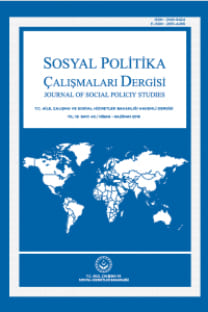Türkiye'de Ailelerin Refah Düzeyi
Türkiye’de ailelerin refah kavramlaştırmalarını öğrenmek ve de ailelerin refah düzeylerini saptamak amacıyla gerçekleştirilen bu calışma, nicel ve nitel veri derleme tekniklerinin birlikte kullanıldığı kapsamlı bir alan araştırması olarak tasarlanmış ve 2010 yılında gerçekleştirilmiştir.
Anahtar Kelimeler:
refah, aile, aile refahı
Welfare of Family in Türkiye
This study carried out to determine theconceptualization of welfare by families in Turkey andthe welfare levels of families, has been designed as acomprehensive field study where qualitative andquantitative data collection methods have been usedcollectively and has been implemented in year 2010.
Keywords:
welfare, family, family welfare,
___
- Akder, H. ve Güvenç, M. (Ed.). (2000). Devlet Re- formu: Yoksulluk. İstanbul: TESEV.
- Akşit, Bahattin ve Akşit, E. E. (1999). Social Conditi- ons. Turkey, Revised Edition, The World Bibliographical Series vol. 27 içinde, Ç. Balim-Harding (ed.). Oxford: Clio Press, 112-119.
- Akşit, Bahattin, Akadlı, B., Atauz, A., Biliker, M.A., Eraydın, A. ve Kasnakoğlu, H. (2003) Türkiye’nin Nüfus ve Kalkınma Yazını: Eleştirel Bir Değerlendirme. Anka- ra: Türkiye Bilimler Akademisi Yayınları.
- Akşit, Bahattin ve Şen, M. (1999). Cumhuriyet Tür- kiye’si Kent ve Köylerinde İnsan ve Hanehalkı Profilleri. Bilanço 1923-1998 Cilt 2: Ekonomi, Toplum ve Çevre içinde, İstanbul: Tarih Vakfı Yayınları, 231-245.
- Akşit, Belma ve Akşit, E. E. (1999). Social servi- ces, health and welfare. World Bibliographical Series: Volume on Turkey içinde, Ç. Balım (Ed.). Oxford: Clio Press.
- Ayata, S. (1991). Sermaye Bikrimi ve Toplumsal Değişim. Ankara: Gündoğdu Yayınları.
- Aysan, M.F. ve Beaujot, R. (2009). Welfare Regi- mes for Aging Populations: No Single Path for Reform. Population and Development Review, 35(4).
- Bauman, Z. (1998). The Rise and Fall of the Wel- fare State. In Work, Consumerism and the New Poor, Buckingham, Phil: Open University Press.
- Boratav, K. (1991). 1980’lı Yıllarda Türkiye’de Sos- yal Sınıflar ve Bölüşüm. İstanbul: Gerçek Yayınevi.
- Boylu, A. A. ve Terzioglu, G.R. (2008). Ailelerin Ya- şam Kalitelerini Etkileyen Bazı Subjektif Göstergelerin İncelenmesi. Hacettepe Üniversitesi İktisadi ve İdari Bilimler Fakültesi Dergisi, 26(2), 1-27.
- Buğra, A. (2008). Kapitalizm, Yoksulluk ve Türki- ye'de Sosyal Politika. İstanbul: İletişim.
- Buğra, A. (2007). AKP Döneminde Sosyal Politika ve Vatandaşlık. Toplum ve Bilim, 108, 143-166.
- Buğra A. ve Keyder, Ç. (2007). Bir Temel Hak Ola- rak Vatandaşlık Gelirine Doğru. İstanbul: İletişim.
- Buğra, A. ve G. Irzık. (1999). Human Needs, Con- sumption and Social Policy. Economics and Philosop- hy, 15, 187-208.
- Dumanlı, R. (1996). Yoksulluk ve Türkiye’deki Bo- yutları. Ankara: DPT Uzmanlık Tezi Yayınları.
- Esping-Andersen, G. (2000). The Sustainability of Welfare States into the Twenty-First Century. Internatio- nal Journal of Health Services, 30(1), 1-12.
- Farmer, P. (2003). Pathologies of Power: Health, Human Rights, and the New War on the Poor. Ber- keley, Los Angeles, London: University of California Press.
- Ferge, Z. (1997). The Perils of the Welfare State’s Withdrawal. Social Research, 64(4), 1381-1402.
- Ferrera, M. (1996). The ‘Southern Model’ of Welfare in Social Europe. Journal of European Social Policy, 6(1), 17-37.
- Güvenç, M. (2004). Turkey's Demography and Eco- nomic Geography: An Overview. Südosteuropa Mittei- lungen, 44, 30-43.
- Haberkern K. ve Szydlik, M. (2010). State care provision, societal opinion and children's care of older parents in II European countries, Ageing & Society, 30, 299-323.
- Howthorn, G. (Ed.). (1987). The Standard of Living. Cambridge: Cambridge University Press.
- Irwin, S. (2009). Locating Where the Action Is: Qu- antitative and Qualitative Lenses on Families, Schoo- ling and Structures of Social Inequality. The Journal of British Sociological Association, 43(6), 1123-1140.
- Kıray, M. (1984). Büyük kent ve değişen aile. Tür- kiye'de Ailenin Değişimi içinde, T. Erder (Ed.). Ankara: Türk Sosyal Bilimler Demeği Yayını.
- Mingione, Enzo. (2001). The Southern European Welfare Model and The Fight Against Poverty and Social Exclusion. Our Fragile World: Challenges and Opportunities for Sustainable Development içinde, M. Tolba (Ed.). Oxford, UK: Eolss Publishers.
- Navarro, Vicente. (1999). The Political Economy of the Welfare State in Developed Capitalist Countries. International Journal of Health Services, 29(1), 1-50.
- Nussbaum, M. C. ve Sen, A. (Ed). (1993). The Qua- lity of Life. Oxford: Oxford University Press.
- Okin, S. M. (2003). Poverty, Well-Being, and Gen- der: What Counts, Who’s Heard?. Philosophy and Pub- lic Affairs, 31 (3), 280-316.
- Özcan, Y. Z., Ayata, S., Akçay, A., Arun, Ö. ve Erci- yes, C. (2003). Toplumsal Yapı, Refah Göstergeleri ve Toplumsal Raporlama. Ankara: Sosyal ve Beşeri Bilim- ler Araştırma Ortak Komitesi, Türkiye Bilimsel ve Teknik Araştırma Kurumu, Türkiye Bilimler Akademisi, T.C. Yüksek Öğretim Kurulu.
- Özcan Y. Z. ve Özcan, K. M. (2003). Measuring Po- verty and Inequality in Turkey. Topics in Middle Eastern and North African Economies, Electronic Journal, 5.
- Pierson, Paul. (2001). Introduction: Investigating the Welfare State at Century’s End. The New Politics of the Welfare State içinde, P. Pierson (Ed.). USA: Oxford University Press.
- Plant, R. (1998). Citizenship, Rights, Welfare. Soci- al Policy and Social Justice içinde, Jane Franklin (Ed.). Cambridge: Polity Press.
- Ravanera, Z.R. ve Rajulton, F. (2010). Measuring Social Capital and Its Differentials by Family Structu- res. Social Indicators Research, 95(1), 63-89.
- Tüzün, S. (2000). Kentsel Türkiye Hane ve Bireyleri İçin Bir Tabakalaşma Modeli Olarak Veri Sosyo-ekono- mik Statü İndeksi (VERİ S.E.S.İ.). Mübeccel Kıray İçin Yazılar, F. Atacan, F. Ercan ve M. Türkay (Ed.). İstan- bul: Bağlan Yayınevi, 371-385.
- Twine, Fred. 1994. Citizenship and Social Rights: The Interdependence of Self and Society. London, Thousand Oaks, New Delhi: Sage Publications.
- Wright, E. O. (1994). Interrogating Inequality. Lon- don: Verso.
- ISSN: 2148-9424
- Yayın Aralığı: Yılda 4 Sayı
- Başlangıç: 2012
- Yayıncı: Aile,Çalışma ve Sosyal Hizmetler Bakanlığı
Sayıdaki Diğer Makaleler
Semiha Feyzioğlu, Ceren Kuşçuoğlu
Sosyal Yardım Algısı ve Yoksulluk Kültürü
Zeynep Hamamcı, Ahmet Buğa, Şenol Duran
Medya Profesyonellerinin ve Medyanın Aile Algısı
Türkiye'de Ailelerin Refah Düzeyi
Aile Destek Hizmetlerinde Kalite Standardı Geliştirme
Prof. Dr. Kasım KARATAŞ, Doç. Dr. Yüksel Baykara ACAR
